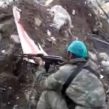
Influence of Chechen Leader of North Caucasian Fighters in Syria Grows
Publication: Eurasia Daily Monitor Volume: 10 Issue: 148
By:

The situation in Syria this past week developed in now typical fashion, with each of the conflicting sides claiming victories. Two events that occurred, however, should be noted. First, the armed Syrian opposition took over the strategically important Minakh military airport in the area of the city of Aleppo. Second, there was news of a split in the Chechen jamaat, Jaish al-Muhajireen wal-Ansar (The Army of Emigrants and Helpers).
The siege of the airport lasted for three months and finally succeeded on August 5 after it was attacked by suicide bombers (https://ummanews.com/news/last-news/11008-2013-08-06-09-35-13.html). The group known as the Islamic State of Iraq and al-Sham is in charge of the insurgent operations in this area and the Jaish al-Muhajireen wal Ansar jamaat is part of that group. Jaish al-Muhajireen wal Ansar is led by Emir Abu Umar Shishani (www.nytimes.com/2013/08/06/world/middleeast/rebels-gain-control-of-government-air-base-in-syria.html?smid=tw-share&_r=0). In the battle for the airport, the members of the North Caucasian jamaat suffered losses, including four deaths among the Chechens (www.kcblog.info/2013/08/blog-post_59.html). Although the media normally considers this jamaat as purely Chechen, it in fact includes members of other North Caucasian ethnic groups. So far, estimates of the numbers of fighters in the jamaat have been fairly inaccurate, ranging from several hundred to 1,700 fighters, half of whom are reportedly Chechen (www.radikal.com.tr/yazarlar/fehim_tastekin/samilin_torunlari_yolunu_sasirdi_kuresel_cihat_yolculugu-1145185).
It became known recently that reportedly an Azeri jamaat is also fighting in the ranks of Jaish al-Muhajireen wal Ansar. The leader of Azeri fighters in Syria, Emir Abu Yahya al-Azeri, who made a statement, calling on people to join his group (https://fisyria.com/?p=393). Naturally, the Azeri militant group is made up of members of Azerbaijan’s Sunni minority.
Even the long expected takeover of the Minakh airport in Aleppo did not overshadow the news about a split among the Chechens in Syria. In a surprise announcement, the emir of Jaish al-Muhajireen wal Ansar, Umar Shishani, made a statement explaining his decision to expel Emir Seifullah along with his 27 men from the group (https://fisyria.com/?p=775). According to Emir Shishani, the decision to distance Jaish al-Muhajireen wal Ansar from Emir Seifullah and his small group was taken at a meeting of the top- and mid-level commanders of the jamaat. Emir Abu Umar Shishani accused the splinter group of embezzlement and stirring up resentment against the North Caucasians among the local population. The jamaat leader said that the splinter group indulged in takfir (apostasy). Most likely, the expelled group members were enriching themselves and shielding their acts from criticism by using dubious arguments from the era of the Islamic conquests. These are serious accusations that will prevent the splinter group from receiving any assistance from other groups.
In a video response, Emir Seifullah rejected the accusations of takfir and of being a troublemaker (www.youtube.com/watch?v=yU6K1mq38jw&feature=youtu.be). In his ten-minute address, he intermittently denied takfir, on the one hand, and, on the other hand, tried to prove that he commanded a far greater force than 27 men. In the video, little more than 30 people can be seen. If Emir Seifullah had more men, he would not have missed the opportunity to show them off in the video. Emir Seifullah is one of the best known people in Syria because he was busily publishing online the videos about the military operations of the jamaat under the command of Umar Shishani. So the splinter group leader had functioned as the press secretary for the jamaat. Speaking in broken Russian, abundantly interspersed with exclamations of “Inshallah,” Emir Seifullah asserted that many people were joining his group, which he insisted was growing quickly.
However, the dissenting emir’s claims are probably not well-founded. Responding to concerns about fueling the local population’s negative attitude toward the North Caucasians, the splinter group leader said that he would never be someone like Emir al-Banat, the Dagestani national suspected of murdering two priests. Emir al-Banat was subsequently forced to leave Syria on the orders of Umar Shishani, who considered al-Banat’s actions provocative and harmful to the North Caucasian jamaat’s cause. That is why Emir Seifullah compared himself to al-Banat and repeatedly said that he would not be like him. The dissenting emir also said that he was slandered by those who had not fought for a single day themselves but, being around Emir Umar Shishani, uttered calumnies against him. Emir Seifullah did not name the people he accused of framing him, but, knowing his character, it is easy to guess that he is likely to name them in upcoming videos.
Emir Seifullah was known only as a press secretary, and, as a military emir, he will soon be forgotten by everyone. Many of those who knew Seifullah in Georgia’s Pankisi Gorge thought that he was in Syria for self-serving purposes. The emir took his wife and nine-year-old son with him to Syria, and his son was also considered a member of the jamaat.
Both emirs, Umar Shishani and Seifullah, come from the Pankisi Gorge, where ethnic Chechens reside. Several dozen members of Umar Shishani’s jamaat come from this area in Georgia. This close relationship, and the personal character of Emir Seifullah, will probably help resolve the conflict in the near future. If the conflict is not resolved, Emir Seifullah is likely to end up like Emir al-Banat, who left Syria and is hiding from everyone.
Peculiarly, this split in the North Caucasian jamaat in Syria does not signify that the influence of Emir Umar Shishani is plummeting. Indeed, quite the contrary: he will now be known for his intolerance of financial fraud and takfir. This will strengthen his position and make him a figure of greater prominence than simply the emir of the North Caucasian fighters in Syria. Umar Shishani is rapidly becoming an equal to the high-ranking Syrian opposition commanders. That will make the Chechen factor an influential one in the changing political landscape of Syria’s civil war.




